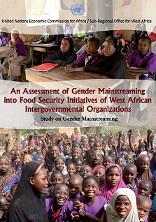Gender mainstreaming into Food Security Initiatives

This report is the first building block of a large initiative aiming to integrate the gender dimension into the West African fight for food security. The core of the project is the introduction of the “gender mainstreaming approach” as a means to support human and economic progress in the subregion.
The present work has mainly consisted to assess at which extent West African Intergovernmental Organizations’ (WAIGOs’) initiatives on food security take into account the gender dimension, and to identify potential related gaps.
The report has proceeded with a “Gender audit” promoted as a basic evaluation and reshaping tool for a number of approaches and policies. The short- to mid-term objective is to feed a constructive dialogue on this issue among stakeholders and grassroots actors. Their reflection has led to a new social and political agenda including women at all levels of decision and actions.
The methodology used consisted of a review of relevant documents, mainly official references and scientific testimonies. Upstream, an analysis of the context was imperative. In this sense, the introduction situates the subregional profile and agricultural production potential.
It also clarifies the guiding principles of the review (women’s roles, needs, and impacts) as well as knowledge relative to gender concepts and gender relations.
The relationship between gender and food security is undeniable and of utmost importance. The double standard, which affects women’s status and their role in agriculture, affects food security in all countries.
This study revealed that gender inequity and the underestimated capacities of women are some of the most significant obstacles to social and economic development in West Africa.
Acknowledging this reality, ECOWAS has long been stressing that “without a more inclusive approach, things can only improve very slowly.” This conviction is widely shared and has been clearly expressed in the context of the Comprehensive Africa Agriculture Development Programme (CAADP) launched in 2004.
Through this progressive programme, African Heads of State have not only focused on agriculture-based development to battle food shortage and penury, but also bet on a gender-mainstreaming platform.
However, among the WAIGOs initiatives put in place over the last decade, many programmes and measures have considered women’s role in agriculture and food security.
Further to a succinct portrait of five organizations involved in the fight against hunger, several actions oriented towards women are presented, and some are clearly inspired by gender mainstreaming. Among those promising initiatives, the Gender Development Centre (ECOWAS and CILLS) of which training sessions have laid foundations for a new framework.
Based on international experience, and in accordance with the third Millennium Development Goal (MDG), the study recommended improvements in the following areas:
(a) Commitment and accountability;
(b) Capacity enhancement;
(c) Suitable tools and guidelines; Economic Community of West African States (ECOWAS), West African Economicand Monetary Union (WAEMU), Mano River Union (MRU), Gambia River Basin Development Organization (OMVG), West African Development Bank (WASB), and Interstate Committee for Drought Control in the Sahel (CILSS).
(d) Training in Gender mainstreaming;
(e) Women empowerment.
(f) Workload distribution; and
(g) Experience sharing.